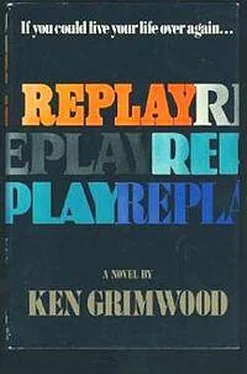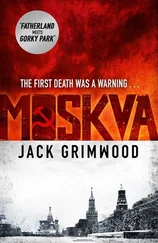"Well … You don’t have to do that. It’s O.K. We’ll be back before Christmas, anyway, and I’d just have to mail them back here again."
Pamela nodded, turned her head away so her son wouldn’t see her eyes.
"I know you’d like to have them with you," Jeff put in. "Why don’t we go ahead and send them along, and we’ll … get you another pair to keep here. We can do that with all your stuff, if J you’d like."
"Hey, that’d be great!" Christopher exclaimed with a grin.
"It makes sense," Jeff said.
"Sure, if I’m gonna be spending half the year with Dad and the other half here with you and Mom … You sure that’d be O.K.? Mom, is that all right with you?"
"It sounds like a very good idea," Pamela said, forcing a smile. "Why don’t you go make a list of all the things you’d like us to send?"
"O.K.," Christopher said, heading toward the two-bedroom annex Jeff had built on to the cabin for the boy and his sister. Then he stopped and turned. "Can I tell Kimberly? I bet there’s a lot of things she’d like to have back east, too."
"Of course," Pamela told him, "but don’t you two take too long about it. We have to leave for Redding in an hour, or you’ll miss your flight."
"We’ll hurry, Mom," he said, running outside to fetch his sister.
Pamela turned to Jeff, let flow the tears she’d been holding back. "I don’t want them to go. It’s still another month before … before…"
He embraced her, smoothed her hair. "We’ve been through all this before," he told her gently. "It’s best for them to have a few weeks to adjust to being with their father again, to make new friends … That may help them absorb the shock a little."
"Jeff," she said, sobbing, "I’m scared! I don’t want to die! Not … die forever, and—"
He hugged her tightly, rocked her in his arms and felt his own tears trickle down his face. "Just think of how we’ve lived. Think of all we’ve done, and let’s try to be grateful for that."
"But we could have done so much more. We could have—"
"Hush," he whispered. "We did all we could. More than either of us ever dreamed when we were first starting out."
She leaned back, searched his eyes as if seeing them for the first time, or the last. "I know," she sighed. "It’s just … I got so used to the endless possibilities, the time … never being bound by our mistakes, always knowing we could go back and change things, make them better. But we didn’t, did we? We only made things different."
A voice droned on interminably in the dim background of Jeff’s consciousness. It didn’t matter who the voice belonged to, or what it might be saying.
Pamela was dead, never to return. The realization washed over him like seawater against an open wound, filled his mind with an all-encompassing grief he had not felt since the loss of his daughter Gretchen. He clenched his fists, lowered his head beneath the weight of the undeniable, the intolerable … and still the voice babbled forth its senseless litany:
"… see if Charlie can get react from Mayor Koch on Reagan’s Bitburg trip. Looks like this one could really whip up into a firestorm; we’ve got the American Legion coming down on him about it, and Congress is starting to buzz. That’s—Jeff? You O.K.?"
"Yeah." He glanced up briefly. "I’m fine. Go ahead."
He was in the conference room of WFYI in New York, the all-news radio station where he’d been news director when first he died. He was seated at one end of a long oval table; the morning and midday editors were on either side of him, and the reporters occupied the other chairs. He hadn’t seen these people for decades, but Jeff recognized the place, the situation, instantly. He’d had this same meeting every weekday morning for years: the daily assignment conference, where the structure of the day’s news coverage was planned as best it could be in advance. Gene Collins, the ongoing midday editor, was frowning at him with j concern.
"You sure you’re feeling all right? We could cut this short; there’s not much else to discuss."
"Just go ahead, Gene. I’ll be fine."
"Well … O.K. Anyway, that’s about it for metro stories and; local angles. On the national front, we’ve got the shuttle going! up this morning, and—"
"Which one?" Jeff rasped out.
"What?" Gene asked, puzzled.
"Which shuttle?"
"Discovery. You know, the one with the senator on board."
Thank God for that at least; so immediately after Pamela’s final death, Jeff wasn’t sure he could have handled a repeat of the chaos and depression in the newsroom on the day of the Challenger disaster. He should have known better, anyway, if he’d been thinking clearly; Reagan had gone to Bitburg in the spring off 1985. That would make this sometime around April of that year, nine or ten months before the shuttle would explode.
Everyone at the table was looking at him strangely, wondering why he seemed so distraught, so disoriented. To hell with it. Let them think whatever they wanted.
"Let’s wrap it up, all right, Gene?"
The editor nodded, began gathering the scattered papers he had brought to the meeting. "Only other good story developing is this rape-recant thing in Illinois. Dotson’s going back to prison today while his lawyer prepares an appeal. That’s it. Questions, anybody?"
"The school-board meeting looks like it might run long today," one of the reporters said. "I don’t know if I’ll be able to make this 2:00 P.M. Fire Department awards thing. You want me to dump out of the school board early, or would you rather put somebody else on the awards?"
"Jeff?" Collins asked, deferring to him. "I don’t care. You decide."
Gene frowned again, started to say something but didn’t. He turned back to the reporters, who had begun to mumble among themselves. "Bill, stick with the school board as long as you need to. Charlie, you hit the Fire Department ceremony after you talk to the mayor. Give us a live shot on Koch and Bitburg at one. Then you can hold off filing until after the awards are over. Oh, and Jim, Mobile Four is in the shop; you’ll be taking Mobile Seven."
The meeting broke up quietly, with none of the usual wisecracks and raucous laughter. The reporters and the offgoing early-morning editor filed out of the conference room, casting quick, covert glances at Jeff. Gene Collins hung behind, stacking and restacking his sheaf of papers.
"You want to talk about it?" he finally said.
Jeff shook his head. "Nothing to talk about. I told you, I’ll be all right."
"Look, if it’s problems with Linda … I mean, I understand. You know what a rough go of it Carol and I had a couple of years back. You helped me through a lot of that—God knows I bent your ear enough—so anytime you want to sit down over a beer, just let me know."
"Thanks, Gene. I appreciate your concern, I really do. But it’s something I have to work out for myself."
Collins shrugged, stood from the table. "That’s up to you," he said. "But if you ever do feel like unloading your problems, feel free to dump a few in my direction. I owe you."
Jeff nodded briefly, then Collins left the room, and he was alone again.
Jeff quit work, made enough bets and short-term-yield investments to enable Linda to get by on her own for the next three years. There was no time to build a major inheritance for her; he increased his life-insurance coverage tenfold and let it go at that.
He moved into a small apartment on the Upper West Side, spent his days and evenings wandering the streets of Manhattan, taking in all the sights and smells and sounds of humanity from which he had so long isolated himself. The old people fascinated him most, their eyes full of distant memories and lost hope, their bodies slumped in anticipation of the end of time.
Читать дальше












